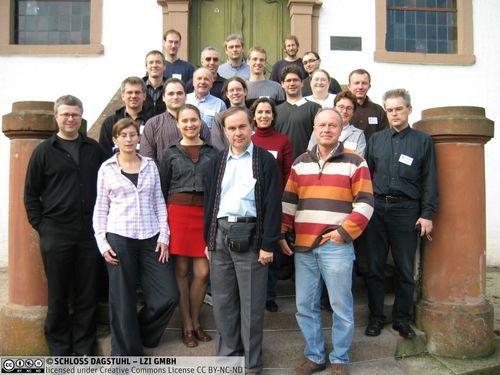Dagstuhl Seminar 05441
Managing and Mining Genome Information: Frontiers in Bioinformatics
( Oct 30 – Nov 04, 2005 )
Permalink
Organizers
- Jacek Blazewicz (Poznan University of Technology, PL)
- Johann-Christoph Freytag (HU Berlin, DE)
- Martin Vingron (MPI für Molekulare Genetik - Berlin, DE)
Contact
Press Release
- Pressemitteilung vom 24.10.2005: "Mit der Bioinformatik die menschlichen Gendaten erforschen" (German only)
Bioinformatics has evolved at the interface of biology (especially molecular biology), mathematics, and computer science. Its main goal is to develop mathematical models of biological phenomena, especially at a molecular level. The models are then used to construct algorithmic methods for the analysis of biomolecular sequences, structures, and more recently functional data and gene networks. In particular, it has become clear during the last years that only a small fraction of the human genome encodes proteins. This leaves the non-coding DNA responsible for the regulatory functions, i.e. the encoding when and where a gene becomes active. However, while algorithms development has constituted an emphasis of bioinformatics for a long time, data used to be stored in flat files with little importance attributed to data base and knowledge management issues. Under the pressure of incoming data, this is currently changing and increasing efforts are dedicated to knowledge management in combination with data analysis in molecular biology and genome research.
Bioinformatics in Dagstuhl Since 1992, several Dagstuhl Seminars on Molecular Bioinformatics took place. Some of these dealt with Bioinformatics in general, while others focused on the more specific topic of Metabolic Pathways. These seminars successfully brought together computer scientists and applied mathematicians with biochemists and molecular biologists in order to discuss possibilities of cooperation in the growing field of analysis of biomolecular sequences and structures. The seminars were seen to be extremely fruitful by the participants. Many contacts were established that provided the basis for future cooperation. In particular, a number of application problems could be formulated providing computer scientists with a sound basis for further work. Many German computer scientists who participated in these seminars have since taken on the challenge of working in bioinformatics .
This seminar understands itself in the tradition of the earlier Dagstuhl Bioinformatics meetings. At the same time the scientific focus shall be shifted to the interplay between biological data management and analysis methods for biological data. This particular area has not constituted the focus of a Dagstuhl Bioinformatics Seminar before. It is of particular relevance today due to the rapid developments of novel high-throughput methods for probing gene function (“functional genomics”). These methods have produced a data deluge unprecedented in the life sciences. Traditional as well a newly developed analysis methods need to applied to these data. In this situation it is of prime importance to interlink data management and analysis methods in the most efficient and flexible manner.
- Jacek Blazewicz (Poznan University of Technology, PL)
- Stefan Bleuler (ETH Zürich, CH)
- Nadia Brauner (IMAG - Grenoble, FR)
- David Corne (University of Reading, GB) [dblp]
- Clarisse Dhaenens (University of Lille I, FR) [dblp]
- Barbara Eckman (IBM Life Sciences - West Chester, US)
- Piotr Formanowicz (Poznan University of Technology, PL)
- Johann-Christoph Freytag (HU Berlin, DE) [dblp]
- Krzysztof Fujarewicz (Silesian University of Technology - Gliwice, PL)
- Anna Gambin (University of Warsaw, PL) [dblp]
- David Gilbert (University of Glasgow, GB) [dblp]
- Misha Kapushesky (European Bioinformatics Institute - Cambridge, GB)
- Marta Kasprzak (Poznan University of Technology, PL) [dblp]
- Ulf Leser (HU Berlin, DE) [dblp]
- Piotr Lukasiak (Poznan University of Technology, PL)
- Steffen Neumann (IPB - Halle, DE) [dblp]
- Sven Rahmann (Universität Bielefeld, DE) [dblp]
- Dietrich Rebholz-Schuhmann (European Bioinformatics Institute - Cambridge, GB)
- Alexander Schliep (MPI für Molekulare Genetik - Berlin, DE) [dblp]
- Florian Sohler (LMU München, DE)
- Andrea Splendiani (Inst. Pasteur et LIX (Paris) & MPI (Berlin), FR) [dblp]
- Marta Szachniuk (Poznan University of Technology, PL) [dblp]
- Jerzy Tiuryn (University of Warsaw, PL)
- Martin Vingron (MPI für Molekulare Genetik - Berlin, DE) [dblp]
- Ralf Zimmer (LMU München, DE) [dblp]


